Chris Baty's Blog, page 99
July 16, 2018
"Some writing days are better than others, and the most important thing is to remember why you write:..."
-

Gloria Chao is an MIT grad turned dentist turned writer. She currently lives in Chicago with her ever-supportive husband, for whom she became a nine-hole golfer (sometimes seven). She was once a black belt in kung-fu and a competitive dancer, but that side of her was drilled and suctioned out. American Panda is her debut novel, and Misaligned is forthcoming fall 2019. Visit her tea-and-book-filled world at gloriachao.wordpress.com and find her on Twitter and Instagram @gloriacchao.
Your Camp Care Package is brought to you by Camp NaNoWriMo. Sign up to receive more Camp Care Packages at campnanowrimo.org.
July 13, 2018
Camp Pep: Do What’s Right for You

Camp NaNoWriMo is nothing without you, our incredible participants. Today, Camp NaNoWriMo participant Juliana Xavier offers you some advice for your second week of Camp:
Dear Wrimos of NaNo past, present and future,
As we continue the second session of Camp this year, many of us are already freaking out at what’s to come. Heck, I’m currently writing this from the not so distant past (July 1st, in fact), and already I want to scurry back to bed to sleep away the winter (I’m in Brazil).
It’s a lot of pressure to keep yourself working non-stop for a month of creative endeavors… and on top of that, you definitely didn’t set up a bunch of unrealistic expectations, right?
Right?
But according to popular belief, unrealistic expectations (among other anxiety- and depression-inducing things) are exactly how content creators should create. “Suffer for your art,” they say!
I shout back, “Nay!” We need not suffer to create great things.
Let’s backtrack: During last November’s NaNo session, I wrote the novel that I want to nurture and carry to full term in the next 9 months (sure, let’s go with that analogy). With that in mind, I decided to use April and July’s session as a way to work on a second and third draft of said novel.
I’ve been away from Camp since 2013 and was pleasantly surprised to discover the new ways I could track progress; through the classic word count or via hours, minutes, or even lines or pages (this is important).
Thing is, right before April’s camp session, my life became a bit of a Greek tragedy. Desperately looking for a way to not let myself fall apart, I dove head first into writing, fully expecting to hit pavement instead of water. Thankfully, it was the latter, and I clocked a whooping 164 hours of writing in April.
If you think that’s excessive, so do I.
By mid-April I was already starting to burn out with writing. Because past me was too lazy to deal with my mental health properly, present me is now so desperate that everything seems dire.
Unrealistic expectations for July’s camp: Third draft go!
Reality: *internally screaming* Deadlines are imminent! Death is imminent! A terrible draft is imminent, give up now!
In my desperation to return to April’s peak productivity, I’ve started badgering my friends for multivitamins as if that was some sort of cure for burnout. Speaking of, got any vitamin D tablets on ya?
How am I supposed to rise like a phoenix for a second month of writing, when I feel so unmotivated to push through the gross death ashes of my ongoing burnout?
Well… that’s why Camp is so important:
“Small steps and tiny progress is still progress.”Tracking my progress in hours instead of word count allows me to see my progress even if I originally wouldn’t count it as such. Time you spend fleshing out characters, unraveling messy plot lines and world building? It all matters.
Sure, I leveraged my pain to create; but maybe I could have had two good months of writing, instead of an excessive one in April, and what’s so far shaping up to be an anxiety-inducing one in July.
Sometimes we are just not all there, and it’s ok not to be hyper productive all the time. If you shoulder the weight of the world, you’ll only add more to your pain. What feels great now might be terrible for you later on. Small steps and tiny progress is still progress.
Rome wasn’t built in a day! G.R.R. Martin didn’t write all of The Winds of Winter in a month! In fact, it’s not even done yet. If he can take years to write his story, so can you. (And remember that you can change your goal during Camp if it doesn’t feel right for you!)
Take care of your health and do what’s write (ha) for you.
Signed,
Your friendly neighborhood Wrimo participant.

Juliana Xavier is a writer, illustrator and sequential artist. SCAD alumna, all about that kid lit. Brazilian born but partially American grown. Works as a freelance artist and would love to draw your fantasy maps and book covers. Coffee is ok (gasp!) but Thai bubble tea is the real MVP. You can find her on her portfolio website, twitter, patreon, and ko-fi page. For inquiries, feel free to e-mail her at hey@juliejubz.com
Top image licensed under Creative Commons from postscapes on Flickr.
July 12, 2018
This week for our #NaNoFlashback fundraising drive, we’re...
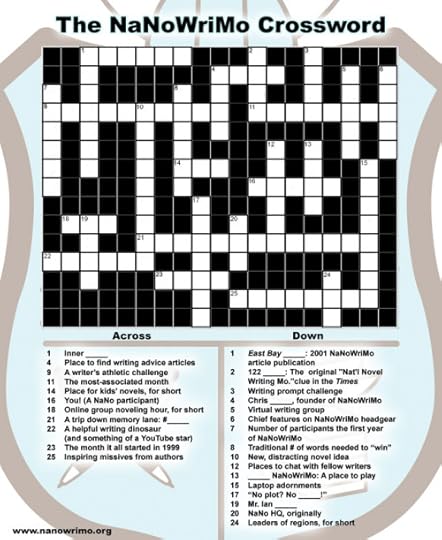
This week for our #NaNoFlashback fundraising drive, we’re looking back at important moments of NaNoWriMo history. In 2006, we finally felt like a household name when we got our first New York Times crossword shout-out. Feeling inspired by that event, we’ve created our own NaNoWriMo crossword puzzle!
1. Inner _____
4. Place to find writing advice articles
9. A writer’s athletic challenge
11. The most-associated month
14. Place for kids’ novels, for short
16. You! (A NaNo participant)
18. Online group noveling hour, for short
21. A trip down memory lane: #_____
22. A helpful writing dinosaur (and something of a YouTube star)
23. The month it all started in 1999
25. Inspiring missives from authors
1. East Bay _____: 2001 NaNoWriMo article publication
2. 122 _____: The original “Nat’l Novel Writing Mo.” clue in the Times
3. Writing prompt challenge
4. Chris _____, founder of NaNoWriMo
5. Virtual writing group
6. Chief features on NaNoWriMo headgear
7. Number of participants the first year of NaNoWriMo
8. Traditional # of words needed to “win”
10. New, distracting novel idea
12. Places to chat with fellow writers
13. _____ NaNoWriMo: a place to play
15. Laptop adornments
17. “No plot? No _____!”
19. Mr. Ian _____
20. NaNo HQ, originally
24. Leaders of regions, for short
View the answers to the crossword puzzle here. Crossword created with the help of crosswordhobbyist.com.
July 11, 2018
“There are going to be times when you feel uninspired, when the...
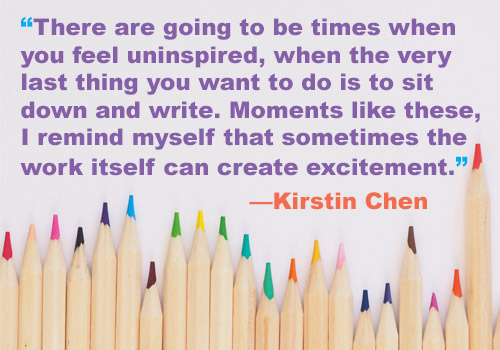
“There are going to be times when you feel uninspired, when the very last thing you want to do is to sit down and write. Moments like these, I remind myself that sometimes the work itself can create excitement.”
—Kirstin Chen’s new novel, Bury What We Cannot Take, has been named a Most Anticipated Upcoming Book by Electric Literature, The Millions, The Rumpus, Harper’s Bazaar, and InStyle, among others. She is also the author of Soy Sauce for Beginners. She was the fall 2017 NTU-NAC National Writer in Residence in Singapore, and has received awards from the Steinbeck Fellows Program, Sewanee, Hedgebrook, and the Napa Valley Writers’ Conference. Born and raised in Singapore, she currently resides in San Francisco.
Your Camp Care Package is brought to you by Camp NaNoWriMo. Sign up to receive more Camp Care Packages at campnanowrimo.org.
Text added over original image by Jess Watters on Unsplash.
July 10, 2018
3 Tips to Manage Mental Chaos While You’re Writing

Camp NaNoWriMo has begun, and you may be feeling the pressure to complete your project. One of the most important things to keep in mind when you’re writing is making sure that your work doesn’t adversely affect your mental health. Today, author and participant Cass Morris shares a few tips to help manage mental chaos:
”Chin up princess, or the crown slips.” That meme, right there? That explains a lot about who I am.
I’ve got what some people call “high-functioning” anxiety, the kind that makes you a constantly over-wound spring but determined not to let anyone know that you’re screaming internally. I am a Slytherin, driven to achieve and to do so publicly—because if other people don’t know about it, does it even count? And if I’m not doing my best, if I’m not meeting all my goals and checking everything off my list, aren’t I just a lazy failure? Aren’t I letting myself down, and thus letting down literally everyone I’ve ever met?
Well, of course not. But the demon in my head doesn’t know that.
If any of that is sounding familiar, my sympathies. I know how rough it is. Here are a few things I keep in mind to help manage the mental chaos:
1. Block off time for things that are not writing.This is hard especially when you’re on a deadline or trying to meet a daily NaNo goal, but it’s a crucial thing to learn. Anxiety and stress quite literally fray your nerves, neurologically speaking. Your brain needs breaks, but if you’re like me, it’s tough to give your brain that permission.
Lately, I’ve been using my bullet journal’s habit tracker to make sure I do things like read for pleasure, tend to my spirituality, and not fall asleep with my phone clutched in my hand. Checking things off on the habit tracker feels like achievement, which assuages the sense of “but if you’re not constantly working, you’re an unproductive loser”. I’m trying to redefine my broken brain’s perception of what productivity is—sometimes it has to be those things which feed your soul and keep you sane. That’s not an indulgence. It’s keeping yourself in top working order by giving your nerves a chance to rest and heal.
2. Celebrate the small victories.If anxiety is something that makes you super goal-oriented, learn to find some smaller benchmarks in addition to the biggies. Your end goal might be finishing your NaNo project, getting published, hitting the bestseller list—but quite apart from the aspects of those things which are outside of your immediate control, those goals are also always going to be delayed gratification. That can make the day-to-day grind a frustrating endeavor.
Give you brain a nice dopamine hit by finding things to celebrate more often: hitting a sprint goal, writing a smashing paragraph, learning a new word. Finding things to take pride and joy in on a more regular basis has really helped me to remember that the major goals do not have to eat my entire life or define my sense of self.
3. If you need more help, get it.Whatever form that help takes—medications, therapy, changes to your life. I wish I had done so much, much earlier. Instead, I struggled for fifteen years, unable to figure out why every so often, my life just seemed to spiral apart beyond my ability to cope with circumstances. Finally seeing a psychiatrist and getting prescriptions to help with anxiety, depression, and insomnia helped immeasurably. They didn’t change who I am—but they dialed the trouble down to a level I could actually manage. That, in turn, made it much easier to actually write. Needing help does not make you weak. Seeking it out is not an indulgence. Accepting it will not dull your creativity.
This anxiety is always going to be a part of me, and in some ways, I’m okay with that. I like being driven to achieve. But I’m also really glad that I’m learning ways to keep it from counterproductively destroying my ability to function. It’s an ongoing process, to be sure! But then, so am I. And there’s nothing wrong with that.

Cass Morris lives and works in central Virginia and the Outer Banks of North Carolina. She completed her Master of Letters at Mary Baldwin University in 2010, and she earned her undergraduate degree, a BA in English with a minor in history, from the College of William and Mary in 2007. She reads voraciously, wears corsets voluntarily, and will beat you at MarioKart. From Unseen Fire (DAW Books, Apr 2018) is her debut novel, currently available in hardcover, ebook, and audiobook. Visit her on her website, Twitter, Instagram, Facebook, and Patreon.
Top image by Ashton Mullins on Unsplash, with added text.
July 9, 2018
"When I’m feeling lost or overwhelmed, I go back, again and again, to this wonderful quote from E.L..."
-

Kirstin Chen’s new novel, Bury What We Cannot Take, has been named a Most Anticipated Upcoming Book by Electric Literature, The Millions, The Rumpus, Harper’s Bazaar, and InStyle, among others. She is also the author of Soy Sauce for Beginners. She was the fall 2017 NTU-NAC National Writer in Residence in Singapore, and has received awards from the Steinbeck Fellows Program, Sewanee, Hedgebrook, and the Napa Valley Writers’ Conference. Born and raised in Singapore, she currently resides in San Francisco.
Your Camp Care Package is brought to you by Camp NaNoWriMo. Sign up to receive more Camp Care Packages at campnanowrimo.org.
July 6, 2018
Camp Pep: Tune Into the Right Station
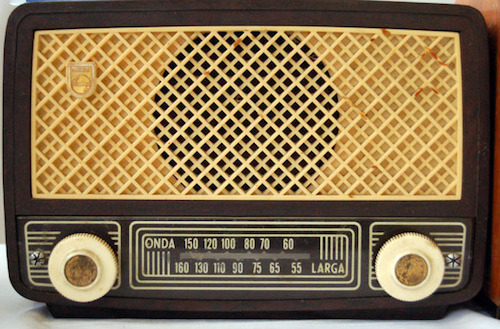
Camp NaNoWriMo is nothing without you, our incredible participants. Today, Camp NaNoWriMo participant Amanda Truscott offers you some advice for your first week of Camp:
Hi there, Writer Friends.
I have a trick for doing your best and most prolific work: pretend you’re a radio. All you have to do is tune into the right station. Now, if this sounds too “woo-woo” for you, that’s cool; I’m only asking you to humor me and give it a try. See what happens. Here’s how you do it:
Sit down with your computer or notebook and become aware of your breathing.At this point, you might think something like, “I can’t think of anything! It’s not working! This is stupid.” Ignore those thoughts.
Tell yourself, “I’m just playing. This is just a game. This isn’t work. All I have to do is show up and play with my book like a kid playing with a ball or blocks. I’m just experimenting. Trying things. That’s all this is.” The above is a mental game I play with myself even when I’m writing something “serious” because it lowers the stakes enough to take Fear out of the equation—or at least to hobble it so it’s easier to outrun.
Breathe. Do your best to sit up straight and keep your shoulders relaxed. Our minds respond to what our bodies do, and slouching makes us feel scared and inadequate, as does shallow breathing. So keep breathing in and out, inhaling and exhaling deeply through your nose. Words will begin to suggest themselves.
When they do, you might think, “What? That’s stupid. I’m not writing that.” Ignore those thoughts too. Write the words.
Keep writing. Repeat steps 1-5 as needed. You’ll find the more willing you are to believe you’re “just playing”, indifferent to the quality of your transmissions (radios, after all, claim no responsibility for Taylor Swift, Limp Bizkit or Chopin), the more easily and joyfully the words will flow through you.
And the more easily and joyfully you write, the better and more plentiful your words will be.
But please don’t think about that part. Thinking about quality is a trap, and it loosens the hobbles on Fear’s ankles so it can catch up and take you down, whispering in your ear with its meaty breath, “The quality of what you do is important. It’s how people will judge you. It’s the proof of your worth as a human, and we already know you’re worthless. Do you want the rest of the world to know it too?”
At which point you can elbow it in the ribs with this thought: “This isn’t work. I’m just playing. It doesn’t matter what I write. It’s just a game. I’m just a radio.”
Breathe in and breathe out. Fear will roll off you, clutching its side.
You will get up. And you will write. And you will cross the finish line, victorious.
And now my own Inner Critic pipes up and says, “You’re mixing too many metaphors, Amanda. You need to be consistent.” So I tell it, “Shut up. I’ll mix as many metaphors as I want. This is my game, and I make up the rules.”
With love and hopes for the wings of your words,
Amanda

Amanda Truscott is the author of Creative Unblocking: Bypass Self-Doubt, Tap your Genius, and Complete Your Best Work. Her current novel is an urban fantasy about a Pomeranian shapeshifter who has to save her people from a cannibal that mixes their blood into a beauty cream. You can find her online at creativeunblocking.com, or offline playing in the wilds of British Columbia.
Top image licensed under Creative Commons from Juanky Pamies Alcubilla on Flickr.
July 5, 2018
NaNoWriMo New Character GeneratorWant to add a little extra...

NaNoWriMo New Character Generator
Want to add a little extra oomph into your story? Or need someone to help get your main character out of a bind? Use your name and birthday to find out what new character you should introduce into your current work in progress!
And don’t forget to update your Camp NaNoWriMo projects—it’s not to late to start!
Follow @nanowrimo and @nanowordsprints on Twitter for more inspiration, and tune in to the Virtual Write-Ins on Youtube.
July 4, 2018
—Claire Kann hails from the glorious Bay Area where the weather...
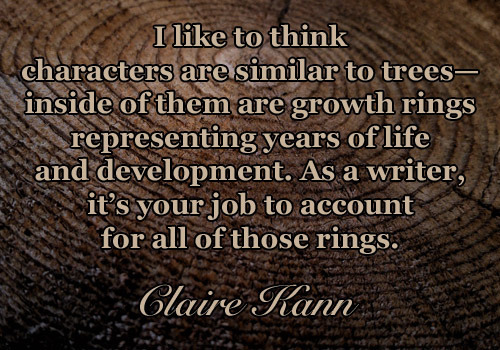
—Claire Kann hails from the glorious Bay Area where the weather is regrettably not nearly as temperate as it used to be. Let’s Talk About Love is her debut YA contemporary novel, published in 2018 with Swoon Reads/Macmillan. A sucker for instant gratification, she also posts new stories regularly to Wattpad, including the two Watty Award-winning stories: The Scavenger Hunt and #Fatgirl Magic.
Your Camp Care Package is brought to you by Camp NaNoWriMo. Sign up to receive more Camp Care Packages at campnanowrimo.org.
Text added over original image by Gabriel Jimenez on Unsplash.
July 3, 2018
How to Put Your Writer’s Block on Mute
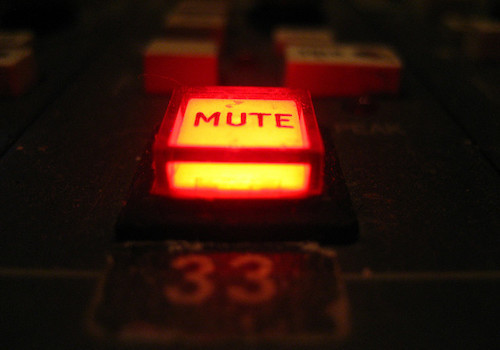
Camp NaNoWriMo has officially begun! A lot of writers feel like they struggle against writer’s block, so how do you overcome that when it overwhelms you? Today, participant Stefanie McAuley shares a tip for getting past those moments of doubt:
I sit at my desk, eyes glazed over. Why can’t my mind go this blank when I attempt to meditate? On my screen it’s just there staring back at me. Blink. Blink. Blink. Blink. How can something so small and controllable be so taunting? And yet, right now I can’t think of a single thing more jeering than the flashing cursor of writer’s block.
“You’ve got this…?” I whisper to myself in what’s intended as a pep-talk but comes out like a question. Inhale. Exhale.
Of course, this usually happens to writers when a deadline is looming—for school, or a paid piece, or a goal set by an over-achieving mind. We must, so we can’t. We freeze under the pressure.
I’m sure you, too, have an arsenal of tricks to get your brain to stop buffering and start flowing. Crowd favorites include a quick walk around the block, wire framing your story arch and filling in the spaces, and my usual choice: the scream-into-a-pillow. While they can be cathartic I’ve found these methods are still too cognitive. Nothing stifles a piece more than muscling your way through the creative process. Even if I manage to hit the deadline, I’m rarely happy with the outcome. What’s worse, I’ve had a really rough day of writing—isn’t this supposed to be fun?—and I’m left deflated, uninspired, and disappointed in my final work.
I needed a better strategy. My poor throw pillows.
“Find an outlet that triggers your creativity and allows you to drop your inhibitions. The time will not be wasted, it’s a simple reset into your creative mindset.”It wasn’t until one day I was driving home from a dance class that it struck me: creativity breeds creativity. After an hour of being lost in the movement and music, my neurons were firing. Stagnant pieces of my storyline were developing into clear, humorous bridges. I blew through my apartment door, barely taking off my shoes, to frantically write everything down before it escaped me.
Yes. Writing is really fun.
Since then, I have a new lease on my writing life. The eleventh-hour used to freak me out—I had no time to waste! Now, I lean into burning time on non-writing. I crank up a killer playlist with a similar tone to the piece I’m writing, and slide my coffee table out of the way. When I’m stuck, I feel like a jammed record player and the end of the last sentence I’ve typed just repeats over, and over, and over, like it’s trying to knock the next one out. That’s not an option when the music is blaring and I’m letting the lyrics flow through me. There’s just me, my body, and the 90s pop diva du jour.
One side-effect of a catchy song is having those lyrics stuck in your head. Make room for your own word flow by setting back to work with some white noise on in your headphones. This proves an effective way to ward off an earworm.
Whatever you do, stop putting the pressure on yourself. While Whitney into a hairbrush mic isn’t for everyone, find an outlet that triggers your creativity and allows you to drop your inhibitions. The time will not be wasted, it’s a simple reset into your creative mindset.
Have fun with it—isn’t that what it’s all about?

As a writer and marketing specialist, global brands call on Stefanie McAuley for thoughtful strategic-planning and effective creative writing. Not one to sit still, Stef has lived on three continents and traveled to fifty countries. Inspired by her travels and life lessons, she started sharing stories on her blog, Broad World. And, her time living in Ghana inspired the work of her first novel—coming soon! Check out her blog, Instagram, & Twitter.
Top image licensed under Creative Commons from Jeremy Keith on Flickr.
Chris Baty's Blog
- Chris Baty's profile
- 63 followers



